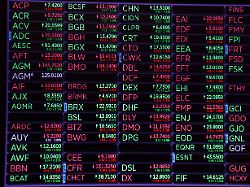Investment gurus lure billions into their hedge funds with the promise of fantastic returns. But reality shows that the vast majority of investment tips from active fund managers are hardly worth a cent.
Speakers at the Sohn Investment Conference have made it to the top of the financial elite. David Einhorn, Bill Ackman, Stanley Druckenmiller – they all made billions as professional money managers. What drives the entire industry brings them to the scene meeting of hedge fund stars: the search for alpha – the deviation from benchmark performance, the investment with above-average returns that beats the overall market.
But perhaps the expensive cherry-picking of stocks, bonds, commodities and foreign exchange is in vain. And Einhorn, Ackman, Druckenmiller & Co. not worth all the money thrown at them. The Wall Street Journal took the test five years ago to take on the crème de la crème of the investment industry. The financial market editors threw darts at the price section of their newspaper. The sobering result: Your randomly assembled portfolio beat the investment tips from Sohn Conference by a mere 22 percent after a year. Just over a third of the pro recommendations even outperformed the S&P 500’s gains over the same period.
Of course, the reporters were just lucky. But that’s the point: most supposed experts who rake in a small fortune managing large fortunes feel the same way. In his famous book A Random Walk Down Wall Street, Burton Malkiel wrote 50 years ago that “a blindfolded monkey throwing darts at the financial section of a newspaper could put together a portfolio that does as well as one that does experts have painstakingly put together”.
Stochastic beats star investors
Not only the Wall Street Journal reporters have impressively demonstrated this. Statistics also regularly show that most active fund managers do not even manage to be as good as the statistical average. Or as it is called on the financial market: the index. For 20 years now, S&P has been monitoring the annual performance of managed funds around the world with its SPIVA reports, calling itself the “de facto arbiter” of the debate. The long-term data shows that around 93 percent of all US equity funds have underperformed their benchmark index over the past ten years. In Europe, around 90 percent of all active managers were subject to the market in the same period.
Because risk and returns are usually normally distributed on the financial market. So the safest way is to simply hold all the stocks in a market at the same time – i.e. buy an index via an ETF, for example, instead of individual stocks. And saves the high administrative costs for the selection of experts. “Why are we still interested in active funds?” asked the “Financial Times” last year.
Only a few very few exceptions prove the rule. A small percentage of money managers actually manage to outperform the market. The trick is to bet on the right horse at the right time. Michael Burry of Scion Asset Management, for example, who was one of the few money managers to correctly predict the big crash of 2008 and made a fortune betting against bad US mortgage securities. Christian Bale created a cinematic monument to him in “The Big Short”. Or the “vulture” Paul Singer, who bought Argentina’s junk bonds with his hedge fund Elliot Management and forced the country to pay off its debts in a year-long court gamble – and thus reaped a return of more than 1000 percent.
In the end, the machine defeats the human
However, their performance is distorted by a special effect. Singer, Einhorn and Co. have an advantage over average investors because of the aura that surrounds them: Their high returns are to a certain extent self-fulfilling prophecies. Because just the news that you are investing in a certain stock often causes prices to rise.
But even the biggest hedge fund legends don’t always manage to consistently beat the market. Perhaps it is their legendary heroic stories that tempt investors, against the law of big numbers, to keep pumping new money into the investment gurus’ financial tips. The promise that you might be one of the chosen few to bet against the tide in the right direction seems too tempting.
Incidentally, the editors of the “Wall Street Journal” have just repeated their dart experiment on the occasion of the fifth anniversary. In a year it will be seen whether they have landed a goal again. And Malkiel’s monkeys really are the better stock managers.
